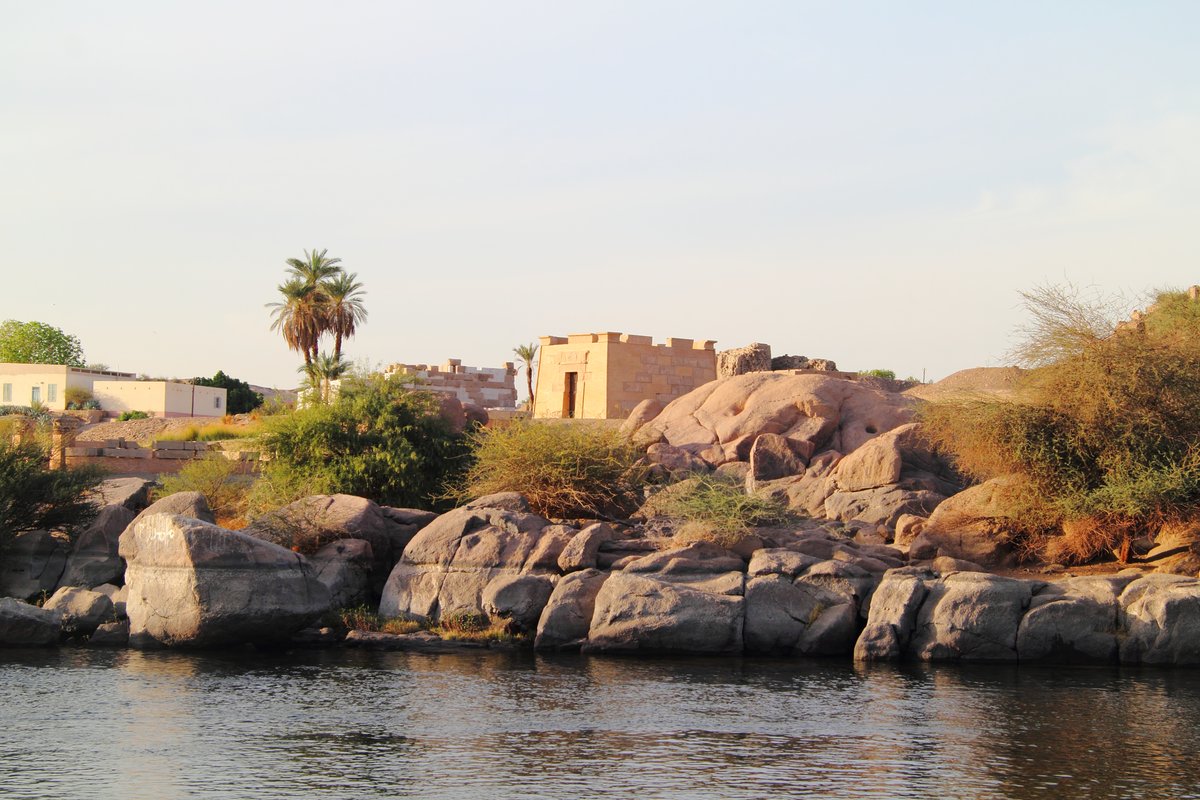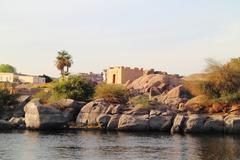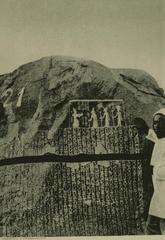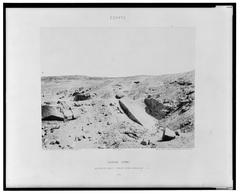
Elephantine Ruins Aswan: Visiting Hours, Tickets, and Historical Sites Guide
Date: 14/06/2025
Introduction to Elephantine Ruins and Their Historical Significance
Elephantine Island, centrally located in the Nile River near Aswan, Egypt, is a living testament to more than five millennia of human history. As one of Egypt’s oldest inhabited sites, Elephantine Island is celebrated for its archaeological significance, religious heritage, and the vitality of its Nubian communities. Historically, the island’s strategic position made it a focal point for trade, military defense, and cultural exchange, particularly between ancient Egypt and Nubia. Visitors today can explore monumental remains like the Temple of Khnum—dedicated to the ram-headed god who controlled the Nile’s inundation—and the island’s exceptionally preserved Nilometer, an ancient device crucial for agricultural planning and taxation (egypttoursgate.com; egypttrippers.com).
Beyond its ruins, Elephantine Island thrives as a center of Nubian culture, with villages such as Siou and Koti showcasing traditional architecture, music, crafts, and daily life (Connolly Cove; Discoveny). The Aswan Museum and guided tours further illuminate the island’s long history, from the Early Dynastic Period through Greco-Roman times and into the present era. Whether you are an archaeology enthusiast or a traveler seeking authentic cultural experiences, Elephantine Island is an essential stop in Aswan (Her Asian Adventures; Luxor and Aswan Travel).
This guide provides practical details—visiting hours, ticketing, accessibility, travel tips, and highlights of nearby attractions—to ensure a rewarding visit to this remarkable site. For the latest updates, download the Audiala app or consult local tourism resources (egypt-uncovered.com; egypttoursgate.com).
Contents
- Introduction
- Historical Background and Cultural Significance
- Origins and Early Settlement
- Religious and Cultural Significance
- Cult of Khnum
- Nilometer and Agricultural Planning
- Other Temples and Shrines
- Political and Military Importance
- Archaeological Discoveries and Ongoing Research
- Preservation of Nubian Heritage
- Visiting Elephantine Island: Practical Information
- Visiting Hours
- Tickets and Entry Fees
- How to Get There
- Accessibility
- Guided Tours and Special Events
- Nearby Attractions
- Photographic Spots and Tips
- Frequently Asked Questions (FAQs)
- Conclusion
Historical Background and Cultural Significance
Origins and Early Settlement
Archaeological evidence shows that Elephantine Island has been settled for nearly 5,000 years (egypttoursgate.com). Its name, from the Greek “Elephantine,” likely references either the island’s shape or its importance in the ivory trade. Excavations have revealed layers of occupation, including houses, administrative buildings, and temples from the Early Dynastic Period onward (egiptoexclusivo.com; academia.edu).
Religious and Cultural Significance
The Cult of Khnum
Central to Elephantine’s religious importance is the Temple of Khnum, a pilgrimage site since the Third Dynasty. The complex expanded through the Middle Kingdom, New Kingdom, and Greco-Roman periods (egypttoursgate.com).
Nilometer and Agricultural Planning
One of Egypt’s best-preserved Nilometers is found on Elephantine. This ancient stairway measured the Nile’s flood levels, essential for predicting crop yields and tax rates (egiptoexclusivo.com).
Other Temples and Shrines
Other noted temples include the South Temple built by Amenhotep III and the North Temple attributed to Sety I or Ramesses II—though largely destroyed, their remains have been thoroughly documented (academia.edu).
Political and Military Importance
Elephantine was a military outpost and customs checkpoint, critical for controlling Egypt’s southern frontier. It played strategic roles through Pharaonic, Persian, and Greco-Roman times and hosted schools of mathematics and astronomy (egypttoursgate.com).
Archaeological Discoveries and Ongoing Research
Major excavations since 1969 by the German Archaeological Institute Cairo and the Swiss Institute for Egyptian Building Archaeology have unearthed vital remains and artifacts; restoration and documentation efforts continue (academia.edu).
Preservation of Nubian Heritage
After the Aswan High Dam’s construction, Nubian communities resettled on Elephantine, preserving their distinctive language, architecture, and customs (egiptoexclusivo.com).
Visiting Elephantine Island: Practical Information
Visiting Hours
- Archaeological sites and the Aswan Museum: 8:00 AM to 5:00 PM daily.
- Hours may shift during Ramadan or national holidays; check locally for updates.
Tickets and Entry Fees
- General admission: 80–150 EGP for foreign visitors (2024–2025 rates).
- Reduced rates for students and Egyptian nationals.
- Tickets sold onsite or via authorized tour operators.
How to Get There
- Access is only by boat from Aswan’s mainland.
- Regular public ferries depart from the Aswan Corniche (10–20 EGP per person).
- Private felucca or motorboat hires are available for flexible or scenic trips (Her Asian Adventures).
Accessibility
- Terrain is uneven, with sandy paths and steps, limiting full wheelchair access.
- Visitors with mobility challenges should consult guides or tour operators in advance.
- Comfortable shoes and water are essential.
Guided Tours and Special Events
- Local guides are available at the ferry landing or through hotels/tour agencies.
- Guided tours (200–400 EGP) provide historical insight and context.
- Occasional festivals highlight Nubian music, dance, and crafts.
Nearby Attractions
- Aswan Museum (on the island)
- Nubian villages of Siou and Koti
- Philae Temple, Unfinished Obelisk, Tombs of the Nobles, and the Monastery of St. Simeon (all accessible via short boat or road trips)
Photographic Spots and Tips
- Temple of Khnum: Dramatic Nile backdrop.
- Nilometer: Unique ancient engineering.
- Nubian villages: Colorful, domed houses and murals.
- Best times: Sunrise or sunset for soft lighting.
- Always ask permission before photographing local residents or private homes.
Frequently Asked Questions (FAQs)
Q: What are Elephantine Island’s visiting hours?
A: 8:00 AM to 5:00 PM daily, with possible variations during holidays.
Q: How can I buy tickets?
A: Onsite at the entrance or through authorized tour operators.
Q: Are guided tours available?
A: Yes, local guides offer tours in several languages.
Q: Is the site accessible for people with disabilities?
A: Accessibility is limited due to uneven terrain; plan ahead and consult providers.
Q: What other attractions are nearby?
A: Aswan Museum, Nubian villages, Philae Temple, Unfinished Obelisk, Tombs of the Nobles, and more.
Practical Tips and Responsible Tourism
- Dress modestly, especially in Nubian villages.
- Carry sun protection (hat, sunscreen, sunglasses) and water.
- Support local artisans by buying crafts directly from them.
- Respect site boundaries and avoid touching ancient structures.
- Participate in workshops and cultural activities for deeper engagement.
- Dispose of litter properly and avoid disturbing wildlife or flora.
Summary and Visitor Recommendations
Elephantine Island masterfully weaves ancient ruins, archaeological intrigue, and vibrant Nubian culture into one must-visit Aswan site. With practical information on visiting hours, ticketing, and navigation, travelers can plan seamlessly. The island’s accessibility by ferry, diverse guided tour offerings, and proximity to other Aswan highlights make it ideal for all visitors. For the fullest experience, take part in a Nubian cooking or craft workshop, enjoy local hospitality, and respect the unique blend of living and ancient heritage that defines Elephantine (egypttrippers.com; Connolly Cove; Her Asian Adventures; agatetravel.com; Luxor and Aswan Travel).
For up-to-date details and exclusive content, download the Audiala app and follow us on social media. Respectful engagement with the island’s communities and heritage ensures a memorable and meaningful visit.
Sources
- Elephantine Island Visiting Hours, Tickets, and Historical Guide to Aswan’s Ancient Site (egypttoursgate.com)
- Elephantine Island Archaeological Sites: Visiting Hours, Tickets & Travel Tips for Aswan Historical Sites (egypttrippers.com)
- Discover Nubian Heritage on Elephantine Island: Visiting Hours, Tickets, and Cultural Experiences (Connolly Cove; Discoveny)
- Elephantine Island Visiting Hours, Tickets, and Travel Tips for Exploring Aswan’s Historic Site (Her Asian Adventures; Luxor and Aswan Travel)
- Elephantine Island Archaeological Sites: Visiting Hours, Tickets & Travel Tips for Aswan Historical Sites (egypt-uncovered.com)
- Elephantine Island Archaeological Sites: Visiting Hours, Tickets & Travel Tips for Aswan Historical Sites (agatetravel.com)




